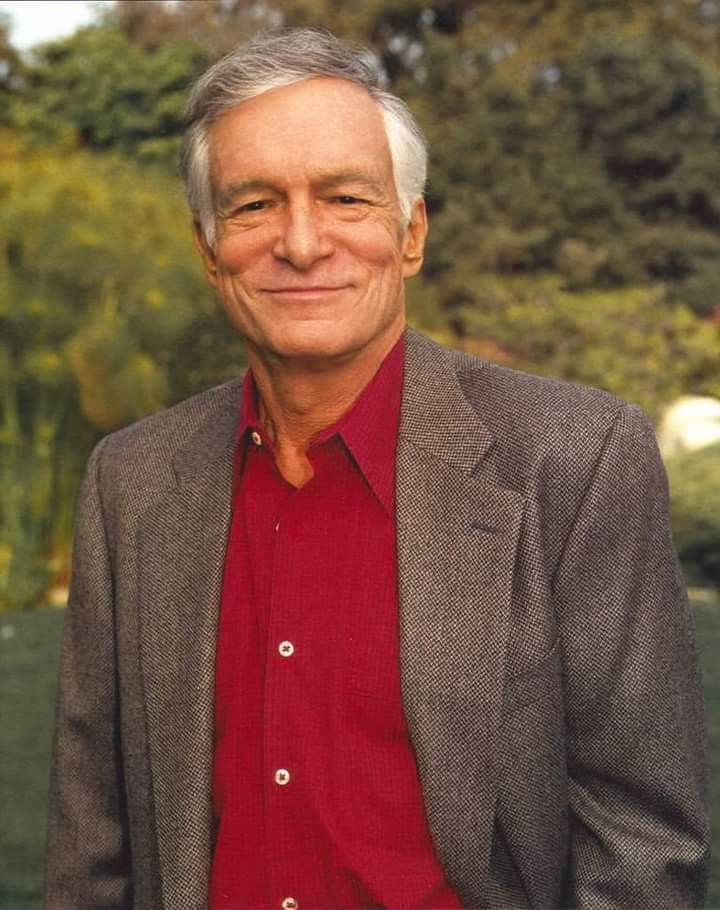Say what you want to about him, but Hef rode this sucka until the wheels fell off! He gave a lot of Blacks opportunities to break their ground, from Zelda Valdes, whom he commissioned to create the Playboy iconic uniform, to hiring and showcasing musicians in his groundbreaking TV show back then, Playboy After Dark, to donating and contributing millions over the years to causes beneficial to us and humankind as a whole. Sleep Well Hef, you’ve earned it! Hugh Marston Hefner (April 9, 1926 – September 27, 2017) was an American publisher and playboy. He was best known as the editor-in-chief of Playboy magazine, which he founded in 1953, and as chief creative officer of Playboy Enterprises, the publishing group that operates the magazine. An advocate of sexual liberation and freedom of expression, Hefner was a political activist and philanthropist in several other causes and public issues.Hefner was born in Chicago, Illinois on April 9, 1926. He was the first child of Grace Caroline (née Swanson; 1895–1997) and Glenn Lucius Hefner (1896–1976), who both worked as teachers. His parents were from Nebraska. He had a younger brother, Keith (1929–2016). Hefner’s mother was of Swedish descent, and his father had German and English ancestry. Through his father’s line, Hefner stated that he was a direct descendant of Plymouth governor William Bradford. He described his family as “conservative, Midwestern, [and] Methodist”.He attended Sayre Elementary School and Steinmetz High School, then during World War II, served as a writer for a military newspaper in the U.S. Army from 1944 to 1946. Hefner graduated from the University of Illinois at Urbana Champaign with a bachelor of arts in psychology and a double minor in creative writing and art in 1949, earning his degree in two and a half years. After graduation, he took a semester of graduate courses in sociology at Northwestern University but dropped out soon after.While he was working as a copywriter for Esquire, Hefner left in January 1952 after being denied a $5 raise. In 1953, he took out a mortgage, generating a bank loan of $600, and raised $8,000 from 45 investors, including $1,000 from his mother (“Not because she believed in the venture,” he told E! in 2006, “but because she believed in her son.”), to launch Playboy, which was initially going to be called Stag Party. The first issue, published in December 1953, featured Marilyn Monroe from her 1949 nude calendar shoot and sold over 50,000 copies. (Hefner, who never met Monroe, bought the crypt next to hers at the Westwood Village Memorial Park Cemetery in 1992 for $75,000.)After the Charles Beaumont science fiction short story “The Crooked Man” was rejected by Esquire magazine in 1955, Hefner agreed to publish it in Playboy. The story highlighted straight men being persecuted in a world where homosexuality was the norm. After the magazine received angry letters, Hefner wrote a response to criticism where he said, “If it was wrong to persecute heterosexuals in a homosexual society then the reverse was wrong, too.” In 1961, Hefner watched Dick Gregory perform at the Herman Roberts Show Bar in Chicago. Based on that performance, Hefner hired Gregory to work at the Chicago Playboy Club; Gregory attributed the subsequent launch of his career to that night.On June 4, 1963, Hefner was arrested for promoting obscene literature after an issue of Playboy featuring nude shots of Jayne Mansfield was published.The case went to trial and resulted in a hung jury.During the civil rights era in 1966, Hefner sent African-American Alex Haley to interview George Lincoln Rockwell, much to Rockwell’s surprise because Haley was black. Rockwell had founded the American Nazi Party and would be later described by some as the “American Hitler”. Rockwell agreed to meet with Haley only after gaining assurance from the Playboy writer that he was not Jewish, although Rockwell kept a handgun on the table throughout the interview. The interview was recreated in Roots: The Next Generations, with James Earl Jones as Haley and Marlon Brando as Rockwell. Haley had also interviewed Malcom X in 1963 and Martin Luther King in 1966 for the newly established 1962 “playboy interview”.In the 1993 The Simpsons episode “Krusty Gets Kancelled”, Hefner guest-voiced himself. In 1999, Hefner financed the Clara Bow documentary, Discovering the It Girl. “Nobody has what Clara had. She defined an era and made her mark on the nation,” he stated. Hefner guest-starred as himself in a 2006 episode of Seth Green’s Robot Chicken on the late-night programming block Adult Swim. He has a star on the Hollywood Walk of Fame for television and has made several movie appearances as himself. In 2009, he received a “worst supporting actor” nomination for a Razzie award for his performance as himself in Miss March. On his official Twitter account he joked about this nomination: “Maybe I didn’t understand the character.” A documentary by Brigitte Berman, Hugh Hefner: Playboy, Activist and Rebel, was released on July 30, 2010. He had previously granted full access to documentary filmmaker and television producer Kevin Burns for the A&E Biography special Hugh Hefner: American Playboy in 1996. Hefner and Burns later collaborated on numerous other television projects, most notably on The Girls Next Door, a reality series that ran for six seasons (2005–2009) and 90 episodes.
Written by Dianne Washington

